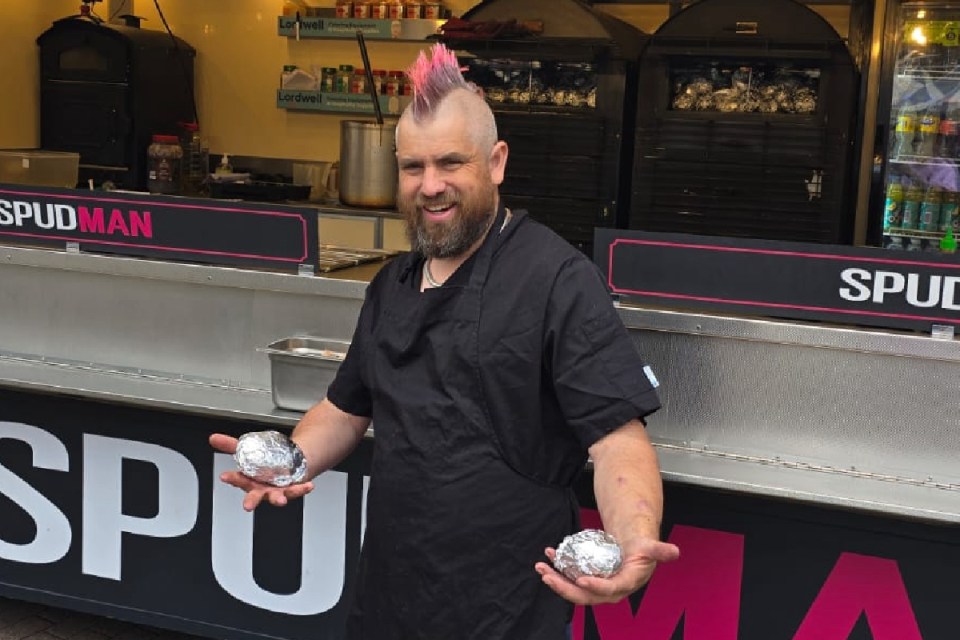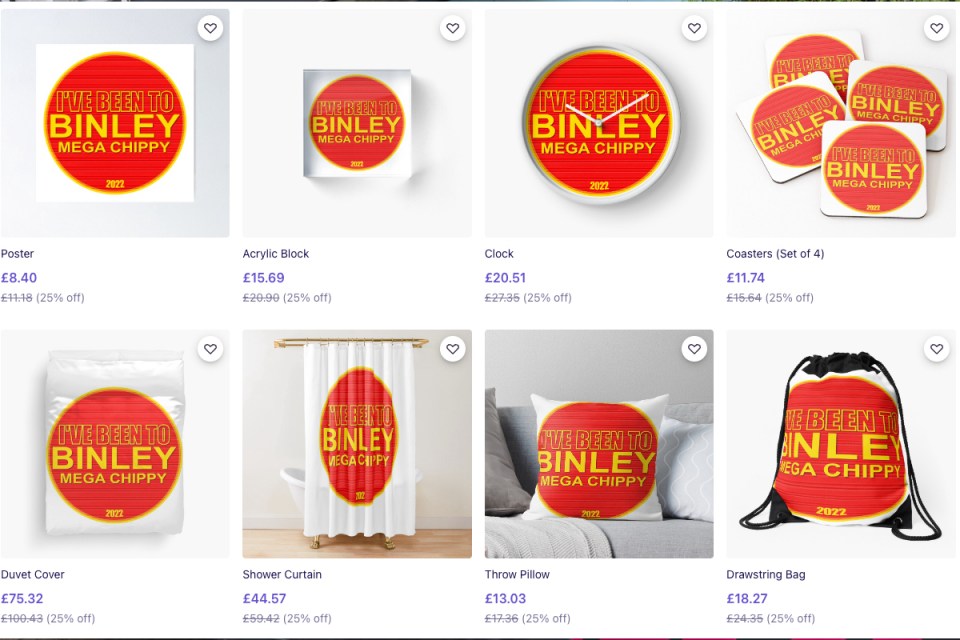When viral fame fades: From Binley Mega Chippy to the Spudman

In March 2022, I visited fish and chip takeaway Binley Mega Chippy in my hometown of Coventry 10 minutes after it had opened for dinner, joining a growing queue of people snaking out across a tarmac car park on the side of a busy A road.
A line of cars waiting for a parking spot were blocking traffic on a road usually populated only by commuters navigating Binley’s concrete jungle of roadworks and roundabouts. One local in front of me was disgruntled at having to stand for twice as long for his regular order as crowds of tweens waited eagerly, phone cameras at the ready.
For weeks, people from all over the world travelled for hours to visit this nondescript chippy. Cars beeped joyfully as they drove past, while teenage boys belted out the anthem that had shot the seemingly unexceptional take-away to stardom.
The Binley Mega Chippy team (and Coventry locals) were baffled by the sudden surge in popularity. Its fame came thanks to a catchy jingle that had gone viral on TikTok. Created by someone unrelated to the business – using the app’s in-built AI voice generator – the tune consists of just three lyrics: “Binley Mega Chippy”, repeated four times to a tune reminiscent of ‘For He’s a Jolly Good Fellow’. It doesn’t take long to pick up. At one point, the chippy’s owner told the BBC that he was doing 10 times his normal trade.
Two years on, there’s no queue outside when I return to the takeaway. There’s no jingle to be heard, either; just the buzzing of the light flickering over the counter and the quiet chatter of the couple of customers waiting. You’re spoilt for choice with space in the car park — but the roadworks that were complicating the junction two years ago are still there.
“It was really tough to handle at the time — [but looking back] everything that happened was positive,” says Vishal Sharma – sporting a Binley Mega Chippy t-shirt once coveted by thousands – who worked at the chippy through its viral moment.
The shop did everything it could to capitalise on its TikTok fans. Redbubble and Etsy pages sold merch ranging from T-shirts bearing the chippy’s name to cushions and shower curtains, while its social media pages encouraged followers to create Binley Mega Chippy fan art. Even now, the legend lives on. “There was a guy from Australia in just a few weeks ago,” Sharma says. “He was wearing his own T-shirt with: ‘It’s paradise, but I’ve never been there: Binley Mega Chippy’ written on it.”
Binley Mega Chippy isn’t the only place to enjoy a brief period of TikTok fame: Gen Z seems to love platforming run-of-the-mill establishments, leading to a sudden and often baffling rise to internet stardom.
Ben Newman, known as Spudman, runs a Tamworth-based jacket potato stand of the same name, which has 3.5m followers on TikTok. Giant letters displaying his adopted name adorn the truck in at least five places, along with cartoon avatars of the man himself.

Newman, a larger than life character who sports a pink mo-hawk, realised his social media efforts had paid off just after Christmas 2023, when one of his videos hit over a million views. Since then, he’s amassed over 70m likes, and his most popular — in which he prepares a cheesy baked potato for his last customer of the day — has over 111.5m views.
Virality sparked a wave of new customers who flocked to the stand, including influencers Newman had followed for years. It even earned him a feature on national radio. “The most surreal moment was having a potato taken down to Scott Mills for his Radio 2 show by a Tamworth train driver,” he says.
Like Binley Mega Chippy, he became an international hit, attracting tourists looking for ‘authentic’ British cuisine: “We’ve had people travel from all over the world for a potato, from [as far afield as] Malaysia and America. People greet me in the street like I’m an old friend!”
Chasing TikTok stardom involves smart forward thinking. British Patagonia, a cafe based in Islington, saw a surge in custom after its summer croissant/ice cream hybrid, the ‘ice crone’, went viral in 2023.
“I spent a few weeks thinking about the product: how to serve it, name it, decorate it. The ice crone was planned and designed in every way — but the popularity that came after was definitely unexpected,” says founder Matias Barbat.

In the absence of a marketing budget, he had initially invited a few micro-influencers to try the product in return for TikTok videos. It blew up and soon bigger TikTok creators were coming of their own volition, dragging their hordes of followers with them.
The cafe, which only opened in 2022, struggled to keep up with the surge in demand: “We started selling 150 to 200 ice crones a day — for us, that was a huge struggle. We weren’t prepared for such demand as we didn’t have much structure. Along the way, we started to get a system in place and found better ways to produce and cope with the demand,” says Barbat.
It’s a luxurious problem to have — but TikTok virality also comes with issues more serious than stock shortages.
For Spudman, the negative side of fame hit him on a personal level. “[There were] fake Google reviews, fake EHO [environmental health officer] complaints and trolls,” he says. “There have also been issues with certain creators who are toxic, creating videos with false information, and negative people from the past doing the same for their own gain.” As his following has grown, so too has the trolling — so much so that his wife has stepped away from the business’ social media after struggling with the negativity.
Charlie Howes, CEO of digital marketing agency Klatch, says the dark side of virality is often overlooked: “The sudden influx of customers can strain resources, lead to long wait times and possibly result in a dip in service quality if the establishment isn’t prepared,” he says. “The attention may be short-lived — if not managed well, the business might struggle to maintain the initial hype.”

Indeed, just as suddenly as TikTok fame hits, the fickle algorithm has a tendency to turn its attention to something else, leaving businesses high and dry.
And though Newman continues to steadily grow his Spudman TikTok following, the effects of his sudden virality have also started to wane. But rather than lament the fleeting fame, he remains positive. “Even though I have peaked and am regularly told I have ‘fallen off’, I remind people that I have done more than most; I am still busy at the trailer and people still visit and support us, and I really appreciate that.”
While TikTok is often criticised for the toxicity that can emerge from its depths, the brief popularity that these independent establishments enjoy — inexplicable as it may be — has given business owners a boost in tough economic times. “With rising expenses, it’s difficult to keep up,” says Barbat; “[The ice crone] definitely helped to sustain the business.”
And despite the downsides, TikTok has allowed Newman to deliver a positive message to an audience he wouldn’t otherwise have had access to — both about his business and his personal health struggles. On his TikTok profile — listed just after a collection of videos documenting his trips to the cash and carry — sits a playlist where he receives kidney dialysis and talks through the process. “It has given me a platform to raise awareness about kidney disease,” he says. “I feel I have created a positive community, both within the potato world but also within my local community.”